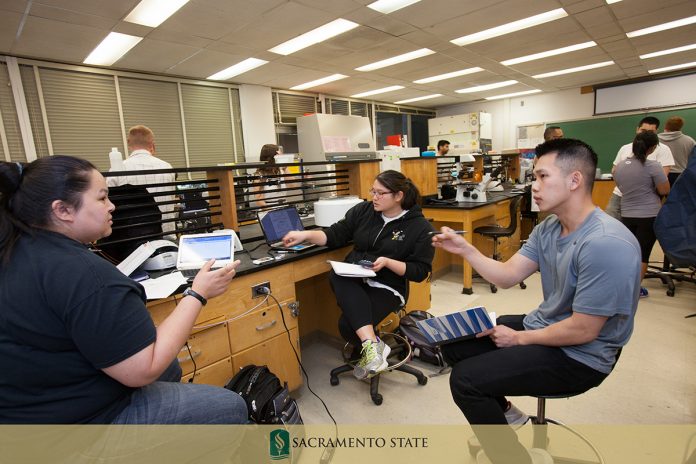On environmental undergraduate research, Professors Tom Landerholm and Kelly McDonald discuss their plan to focus all of their students on the research needed for a local river to recover
When we as citizens look around the world today there are many concerns that make us pause. The growth of populations, socio-political strife, the destruction of the natural environment, exposure to toxic materials at home, at work and to those we love. We see these changes everywhere, from local regions with unique ecologies and politics to competing needs for large swaths of oceans and rainforests, to changes in global economics and climate.
When we as scientists look around the world today we understand that now is not the time to pause. These many concerns lead to an increased need for evidence-based policy, citizen scientists and environmental stewardship. Towards this, STEM leadership across the globe calls for training students at every level in the way that working scientists and engineers do business and with a sense of stewardship. Thus, creating a new generation of citizens capable of exploring, monitoring and remediating our impacts on the world. Yet today, and not for the first time, we are faced with reduced science budgets and an increased politicising of science. So, how do we navigate through these unsettled waters? How do we tackle so many problems with so few resources? How do we give new generations the tools to address the problems of the 21st century?
The SIRIUS Project: A model for doing real science in any classroom
California State University, Sacramento is creating a model that balances these competing needs, called Sustainable Interdisciplinary Research to Inspire Undergraduate Success. This is a model for sustainable science performed at relatively low cost. This is science aimed at local, regional or global problems performed as part of the standard training for every STEM student. To do this, all students must be encouraged to inquire and discover, understand the relevance of their work beyond the classroom, fail and repeat their work – just like a working scientist.
The SIRIUS Project began by redesigning biology classes to collect and analyse real data about the American River that runs through our campus. This urban river has been listed as ‘impaired’ since the 1970’s. We started our students with monitoring changes in ecological relationships, bacterial diversity and toxicology along the river. Following a classroom model called Course-based Undergraduate Research Experiences (CUREs), we integrated twelve courses along these three threads from our intro series through our advanced courses. Importantly, few courses modified their entire semester. Most developed a module encompassing a few weeks, usually changing concepts that they were already trying to teach into river investigations.
Since then, we have added six courses in Chemistry, Geology and Environmental Studies that allow us to collect abiotic data (temperature, pH, potential toxin levels, etc.) to go with our biological data, to compare surface water with groundwater reservoirs and to add human risk assessment to our toxicology studies. Our next goal is to incorporate all of the STEM disciplines at Sacramento State and our four local community college campuses. More STEM disciplines mean more interdisciplinary engagement and better solutions to the problems we face. Engaging all STEM undergraduates in Sacramento will give our scientist-teachers more than 6,000 pairs of hands each semester to work towards a resolution. But even this may be too narrow a view. What might the students training in policy, law, recreation studies, etc. add to the work of SIRIUS? What problems do other communities face that could be studied and, perhaps, resolved by their local educational institutions?
A diversity of inputs leads to better solutions
Scientific American (2014) points out that: “Decades of research by organisational scientists, psychologists, sociologists, economists and demographers show that socially diverse groups (that is, those with a diversity of race, ethnicity, gender and sexual orientation) are more innovative than homogeneous groups.” An important aspect of the SIRIUS Project is our specific goal to train 100% of our STEM undergraduates to do research. The traditional training of researchers involves apprentice-style training in the laboratory of an established investigator. However, limited resources mean that there is inequality in the distribution of these opportunities. Most occur after hours or during summer breaks, a time when many undergraduates must work. Most go to students who have financial help from families, excel academically and already know about the benefits of research. This has severely limited the diversity in STEM, from the professorship down to each graduating class. Hence, redefining these opportunities is critical to this innovative diversity.
Help getting started and the sky is now the limit
SIRIUS is a project that can, essentially, be replicated by any college or university. Once the CUREs are established, the research can evolve and be sustained with normal course budgets. Each institution must assess their needs and seek funding to establish their CUREs. At Sacramento State, a primarily undergraduate institution, our biggest needs were in training faculty to design and implement CUREs and in retrofitting teaching laboratories with equipment to carry out the relevant science. The Division of Undergraduate Education at the National Science Foundation (NSF) provided the time and resources for training faculty and the Major Research Instrumentation program at NSF and the Undergraduate Education Program at the W.M. Keck Foundation in Los Angeles, CA provided grants to purchase equipment.
Now our only question is: How many colleges, teachers and students does it take to change the world?
Please note: this is a commercial profile
Thomas E. Landerholm, PhD
Professor
California State University, Sacramento
Tel: +1 916 278 6707
Kelly K. McDonald, PhD
Associate Professor
California State University, Sacramento
Tel: +1 916 278 5836











